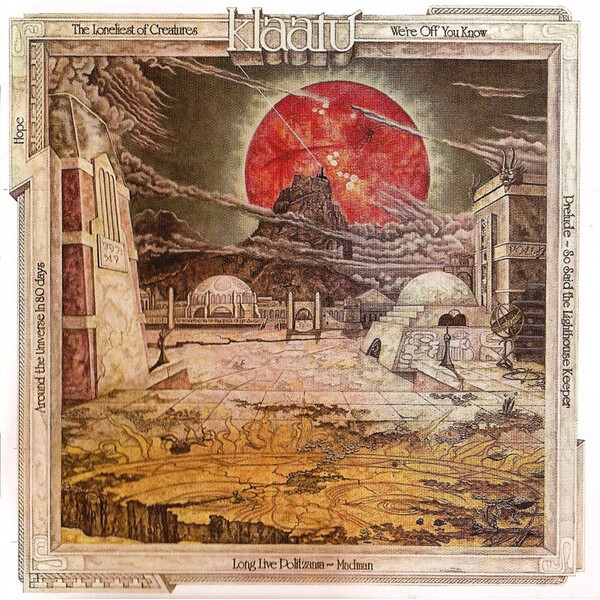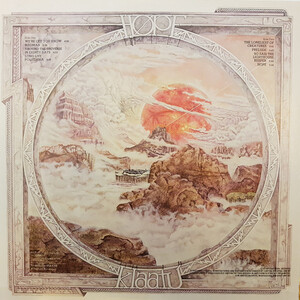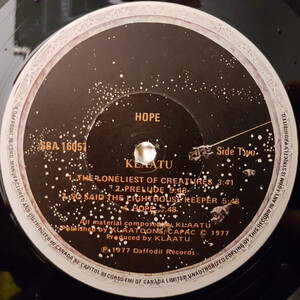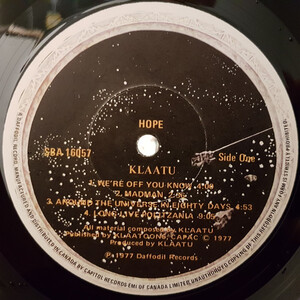Information/Write-up
Klaatu is a music industry phenomenon. Never before has a group refused to be identified ("we want out music to stand on its own merits") and still become so highly successful.
It all started when Capitol Records released the group's self-titled debut album in August 1976, with little fanfare. Purchased by Capitol as a completed master recording, the label agreed to release it because of the quality and commercial sound of the music even though Klaatu's representative, Frank Davies, refused to divulge any information about the band. The only information on the album was the Klaatu wrote all the songs and produced the record themselves. Davies pointed out that the name Klaatu refers to a space visitor in a 1951 sci-fi movie, "The Day The Earth Stood Still."
The initial wave of reviews had music critics throughout North America comparing Klaatu's sound to groups like The Beatles, Pink Floyd, and The Beach Boys. However, the album received only moderate response from the record buying public until nearly a half-year later when rumors began to circulate that Klaatu might very well be another very famous band incognito.
With the new-found attention focused on the album, suddenly radio stations everywhere began playing it and journalists began writing in-depth features speculating on the identities of the musicians involved. Because the music was so appealing, listeners all over the country were dying to find out who Klaatu might really be. But the group continued to remain secretive and continued recording their second album.
Meanwhile, the first album mushroomed into a nationwide (and later international) bestseller and soared into the Top 40 on the national pop charts. The album also spawned a double-sided hit single, "Sub-Rosa Subway" / "Calling Occupants of Interplanetary Craft."
The first album was a collection of eight separate songs tied together with a subtle concept that related to travel and communication in the past, present and future on a planet called Klaatu (depicted on the back cover) intended to resemble Earth and thus forecast Earth's possible destiny. Several of the songs dealt with outer-space including the first tune, "Calling Occupants of Interplanetary Craft," in which Klaatu sang: "Please come in peace, we beseech you. Only a landing would teach them, or earth may never survive." By the last tune, "Little Neutrino," the various races of the planet Klaatu are unable to live with each other and end up destroying themselves (the explosions are heard at the end of the album).
Now, hundreds of thousands of fans later, Klaatu returns with their second Capitol album, Hope, a thematically linked science fiction fantasy (Klaatu considers it the second chapter of the story begun on the first album). Hope plots the course of a group of space travelers who visit the remnants of a distant planet (the same one that blew up on the first record). They had recently discovered the asteroid due to a fine, but intense shaft of light that emanated from its surface. The fragment of planet was one of the many pieces that were hurled across the universe by the holocaust that destroyed the planet Klaatu on the first album. The bits of planet formed a huge asteroid belt which came to be known as the space graveyard. The visitors discover an ancient civilization called Politzania which also was destroyed in the explosion. Yet amidst the ruins a lighthouse beams in the night manned by the only survivor of the planet, the old lighthouse keeper. The lighthouse with its laser flare (which the visitors followed to the planet) warns interstellar travelers of the impending danger of the solar reef. The keeper of the light has spent his life searching for a philosophy, prayer, or phrase that might help bring eternal peace. Klaatu sings: "When to his end the old man came, Death told him, 'You'll not die in vain'... And had we heard his parting word, we'd know that he had said... Hope."
The promotional booklet then includes all the lyrics from the second album (which were also on the album's liner notes) including the part at the end of "So said the lighthouse keeper" which was not actually sung on the album. The following lyric should be inserted after the following line is sung:
...his last remaining day.
Epilogue
When to his end the old man came,
Death told him, "you'll not die in vain,"
And on his lips the fatal kiss was placed.
But from within his falling chest,
The old man uttered one last breath,
And had we heard his parting word,
We'd know that he had said...





No Comments